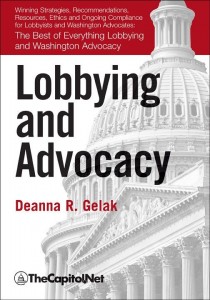The legislative environment can involve a high degree of pressure and present challenges to the lobbyist for strategic planning. Organizations that take time to invest in staff training, strategic planning and goal updates will be rewarded in the long term, including sustained legislative success and effective representation of client or member interests. Strategic planning can also provide crisis avoidance.

When it comes to planning strategies, you want to “plan your planning.” Whenever practical and feasible, schedule strategic planning sessions during congressional recesses or during other times when lobbying work is likely to be slow. Effective planning requires intense concentration and it is better to schedule your planning sessions when you will be free from distractions.
You may find that a change of venue can benefit your  team in developing press ideas and perspectives as you revamp and refine your plans. In order to minimize interruptions and distractions, establish ground rules regarding the use of electronic devices during such planning sessions. At the same time, expect the unexpected and build in some flexibility to your plans to allow for new issues and unexpected developments.
team in developing press ideas and perspectives as you revamp and refine your plans. In order to minimize interruptions and distractions, establish ground rules regarding the use of electronic devices during such planning sessions. At the same time, expect the unexpected and build in some flexibility to your plans to allow for new issues and unexpected developments.
Effective lobbyists work toward building a balance of communication and advocacy with those organizations they represent. In particular, lobbyists must balance their direct lobbying through advocacy work, interacting with those they represent, departmental and inter-departmental organizational activities and activities that are necessary for meeting long-term goals.
Rather than merely responding to issues as they arise, keep the end goal in mind and ensure you have a plan that will prepare you for upcoming legislative sessions. Ask yourself what it is that you will be most proud to announce at the end of the year? Once you have that picture visualized, work toward developing a plan for making it happen.
For more information about effective planning and advocacy, consider TheCapitol.Net’s 1-day course, Strategies for Working with Congress: Effective Communication and Advocacy on Capitol Hill and their 3-day Capitol Hill Workshop.
Reference: Lobbying and Advocacy, by Deanna Gelak, Section 6.2 Basic Government Affairs Planning Strategies
Courses
- Congressional Operations Briefing – Capitol Hill Workshop
- Congressional Dynamics and the Legislative Process
- Drafting Federal Legislation and Amendments
- Understanding Congressional Budgeting and Appropriations
- Advanced Legislative Procedure
Publications
CongressionalGlossary.com, from TheCapitol.Net
For more than 40 years, TheCapitol.Net and its predecessor, Congressional Quarterly Executive Conferences, have been teaching professionals from government, military, business, and NGOs about the dynamics and operations of the legislative and executive branches and how to work with them.
Our custom on-site and online training, publications, and audio courses include congressional operations, legislative and budget process, communication and advocacy, media and public relations, testifying before Congress, research skills, legislative drafting, critical thinking and writing, and more.
TheCapitol.Net is on the GSA Schedule, MAS, for custom on-site and online training. GSA Contract GS02F0192X
TheCapitol.Net is now owned by the Sunwater Institute.
Teaching how Washington and Congress work ™

